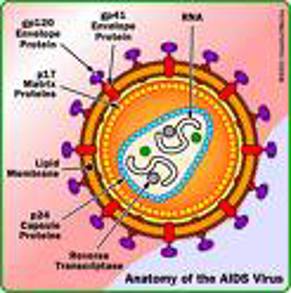What is HIV?
HIV stands for human immunodeficiency virus. HIV destroys certain white blood cells called CD4+ T cells. These cells are critical to the normal function of the human immune system, which defends the body against illness. When HIV weakens the immune system, a person is more susceptible to developing a variety of cancers and becoming infected with viruses, bacteria and parasites.
HIV (human immunodeficiency virus) is the virus that causes AIDS. This virus may be passed from one person to another when infected blood, semen, or vaginal secretions come in contact with an uninfected person’s broken skin or mucous membranes*. In addition, infected pregnant women can pass HIV to their baby during pregnancy or delivery, as well as through breast-feeding. People with HIV have what is called HIV infection. Some of these people will develop AIDS as a result of their HIV infection.
|
Anatomy of AIDS Virus |
Life Cycle of HIV |
What is AIDS?
AIDS stands for Acquired Immunodeficiency Syndrome. AIDS is a syndrome, which is the name given to a collection of symptoms and effects that occur together. AIDS is the collection of symptoms, signs, and characteristics that occur once a person's immune system has been substantially weakened by HIV infection.
AIDS can be diagnosed in two ways: A person with HIV may be diagnosed with AIDS if he or she contracts a disease that is listed as an "AIDS-defining" disease. People with healthy immune systems are usually able to easily fight off these "AIDS-defining" diseases, but for a person with a weakened immune system because of HIV, they are very serious and can be life-threatening.
The other way AIDS is diagnosed is if testing shows that part of an HIV-positive person's immune system is determined to have weakened to a very low level, making them vulnerable to a wide range of infections, diseases and cancers. Infections that cause disease in people with a weakened immune system are often called "opportunistic infections".
How long does it take for HIV to cause AIDS?
It is very difficult to say with certainty how long HIV will take to cause AIDS. On average (median), it takes more than 10 years for HIV to progress to AIDS. The time it takes is different for everyone, and depends on many things, including the health and lifestyle of the person, the strength of his or her immune system, and other factors such as a person's age and immunity levels to other diseases. Another factor affecting how long HIV takes to cause AIDS is the growing effectiveness of the antiretroviral drugs that slow the spread of HIV in the body. As these drugs improve, people who are treated for HIV are taking a longer time to develop AIDS.
Because of all of these factors, and the constantly changing effectiveness of medications, there are currently no reliable estimates on how long on average HIV takes to progress into AIDS.

|
Infected person’s blood, semen, vaginal fluid are rich in HIV. However tears, saliva, sweat or urine do not pose any danger? HIV is transmitted by:
|
||
How is HIV not transmitted by :
|



